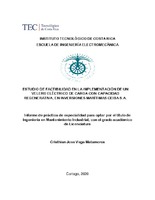Mostrar el registro sencillo del ítem
Estudio de factibilidad en la implementación de un velero eléctrico de carga con capacidad regenerativa, en Inversiones Marítimas Ceiba S.A.
| dc.contributor.advisor | Mata-Ortega, Sebastián | es |
| dc.contributor.author | Vega-Matamoros, Cristhian José | |
| dc.date.accessioned | 2020-08-20T16:26:09Z | |
| dc.date.available | 2020-08-20T16:26:09Z | |
| dc.date.issued | 2020 | |
| dc.identifier.uri | https://hdl.handle.net/2238/11501 | |
| dc.description | Proyecto de Graduación (Licenciatura en Mantenimiento Industrial) Instituto Tecnológico de Costa Rica, Escuela de Ingeniería Electromecánica, 2020 | es |
| dc.description.abstract | La falta de alternativas energéticas en el transporte marítimo ha ocasionado que los combustibles pesados de petróleo sean los reyes de los mares en estos momentos. Los grandes cargueros se basan en la hipótesis de que a mayor capacidad de carga menor será el factor de emisión por unidad transportada; aunque, en magnitud, un carguero que consume cientos de toneladas de combustible pesado y, por ende, emite a la atmósfera un par de cientos más de CO2, a simple vista, no pareciera estar aportando ningún beneficio al ambiente. Mediante este trabajo se realizó el análisis de una alternativa de transporte marítimo más amigable con el ambiente, el uso de la tradicional vela y la incorporación de sistemas auxiliares eléctricos. El análisis incluyó tres ejes principales: desde el punto de vista financiero, se constató que potencialmente podría generar mayores dividendos que si se incorporara un sistema auxiliar de diésel; desde el punto de vista técnico, se obtuvieron resultados teóricos esperanzadores para un sistema capaz de regenerar la energía eléctrica que después consumiría el barco; y desde el punto de vista ambiental, se confirmó que a lo largo de la vida útil, las emisiones de CO2 asociadas a la fabricación y operación de la embarcación son menores a las que se tendrían en la misma embarcación con un motor auxiliar de diésel. Además, se sentaron las bases para la implementación de un sistema que sea capaz de obtener datos a fin de probar, de manera concreta, las idealizaciones teóricas obtenidas. | es |
| dc.description.abstract | The lack of energy alternatives in shipping has caused heavy oil fuels to be the kings of the seas nowadays. Large vessels are based on the hypothesis that a higher load capacity will mean less emissions per unit transported, although in magnitude, a vessel that consumes hundreds of tons of heavy fuel and therefore emits a couple of hundreds more CO2, in a simple glance does not seem to be giving any benefit to the environment. Through this work, the analysis of a more environmentally friendly alternative of maritime transport, the use of traditional sailing and the incorporation of auxiliary electrical systems was carried out. The analysis included three main axes, from a financial point of view, it was found that it could potentially generate higher dividends than that of an incorporated diesel auxiliary system. From the technical point of view, promising theoretical results were obtained for a system capable of regenerating the electrical energy that would later be consumed by the ship, and from the environmental point of view, it was obtained that throughout the lifetime of use, CO2 emissions associated with manufacturing and operating of the boat are less than what would be had in the same boat with an auxiliary diesel engine. In addition, the foundations were laid for the implementation of a system that can obtain data that can concretely prove the theoretical idealizations that have been obtained. | es |
| dc.language.iso | spa | es |
| dc.publisher | Instituto Tecnológico de Costa Rica | es |
| dc.rights | acceso abierto | es |
| dc.subject | Estudio de factibilidad | es |
| dc.subject | Capacidad regenerativa | es |
| dc.subject | Sistema regenerativo | es |
| dc.subject | Motores eléctricos | es |
| dc.subject | Transporte marítimo | es |
| dc.subject | Transporte acuático | es |
| dc.subject | Emisiones | es |
| dc.subject | Navegación | es |
| dc.subject | Energía eléctrica | es |
| dc.subject | Feasibility study | es |
| dc.subject | Regenerative capacity | es |
| dc.subject | Regenerative system | es |
| dc.subject | Electric motors | es |
| dc.subject | Marine transportation | es |
| dc.subject | Aquatic transportation | es |
| dc.subject | Emissions | es |
| dc.subject | Navigation | es |
| dc.subject | Electric power | es |
| dc.subject | Research Subject Categories::TECHNOLOGY::Engineering mechanics::Vehicle engineering | es |
| dc.title | Estudio de factibilidad en la implementación de un velero eléctrico de carga con capacidad regenerativa, en Inversiones Marítimas Ceiba S.A. | es |
| dc.type | proyecto fin de carrera | es |


